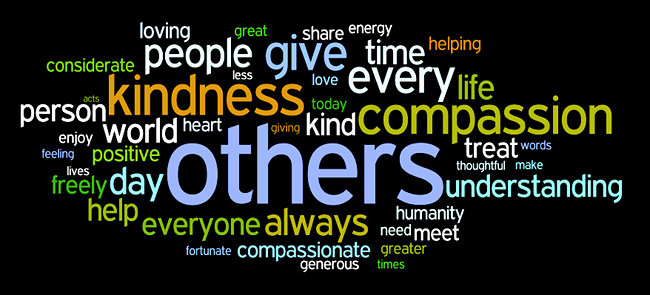What Is Compassion
Compassion is defined as a deep awareness of the suffering of another and a keen desire to alleviate the suffering. Self-compassion is taking this definition and applying it to ourselves. So much of our inner turmoil centers around our negative self-concepts--not believing we are good enough when comparing ourselves to others, berating ourselves when we make a mistake or when we do not accomplish the things we think we should, and scolding or shaming ourselves when we feel we do not fit our imaged vision of ourselves. These types of negative internal dialogues create emotional distress and suffering.How Self-Compassion Makes Us Happier
When we develop self-compassion we develop the ability to learn from our mistakes. Learning from our mistakes allows us to grow and to mature emotionally. When we practice self-compassion we stop engaging in self-destructive behaviors such as criticizing ourselves, being harsh, and degrading ourselves for mistakes or perceived failures. Self-criticism (the opposite of self-compassion) is emotionally unhealthy and leads to avoidant behaviors, feelings of shame, and feelings of self-loathing. All of these feelings inhibit us from reaching our full potential, taking risks, and living a full and rewarding life. Studies have shown that being easier on ourselves and accepting our imperfections is a BIG step towards leading a healthier and happier life. We all make mistakes and our goal in life should not be to avoid this inevitable fact.People who practice self-compassion are less depressed, less anxious, and report to have more satisfying and genuine relationships. Many people are reluctant to practice self-compassion because they confuse self-compassion with self-pity. Pity is experienced as feelings of sorrow towards another who is suffering but is felt at a distance and with a sense of aloofness. Pity does not always motivate us to alleviate another's suffering like compassion does. Compassion makes us mindful of our own thoughts, requires each of us to have a sense of common humanity and requires us to be able to treat ourselves kindly. Practicing self-compassion also leads us to the emotional maturity needed to accept the reality that in life everyone will experience difficult times.
Tips For Developing Self-Compassion
1. Ask yourself: "Am I treating myself with kindness?" If you find you are not, think of ways in which you can be kinder to yourself. For example write a list of all the things you admire about yourself.
2. If you find you are being self-critical give yourself permission to take a break. Self-criticism can lead to feelings of shame and avoidant behaviors-all of which inhibit emotional growth.
3. When you do make a mistake ask yourself what you can do differently the next time you are confronted with a similar situation. Remind yourself that the goal in life is not to make a mistake rather it is to learn from our mistakes so we can grow and mature emotionally.
Stay-tuned for next week's post about the second key to happiness.
Do you have self-compassion? Do you find it difficult to practice self-compassion? How do you think self-compassion can help you achieve your potential and lead to a more satisfying and enriched life? I want to hear from you.
This post was written by Paula Durlofsky, Ph.D. A practicing psychologist in Bryn Mawr, PA. To learn more about me and my practice please visit Paula Durlofsky, Ph.D.


Compassion is the food for our life. Without it, we would be living a life without any specific values or directions.
ReplyDeletehttp://asknrj.com/a-herb-called-self-compassion/